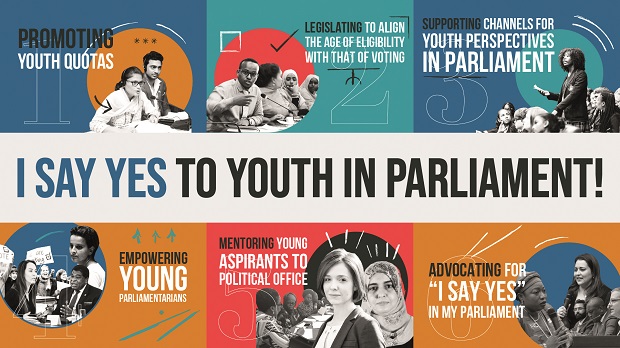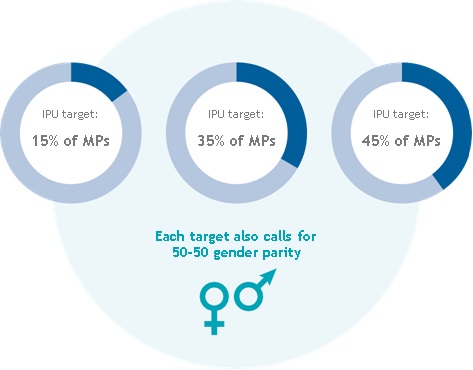Objective 6 2017-2021
Youth empowerment
Youth participation is key to democracy and inclusive, efficient political processes. Young women and men are central to social challenges such as poverty, discrimination and climate change. And their participation in politics promotes active citizenship and strengthens social responsibility. It offers innovation, creativity and new thinking.
In the five-year strategic period, the IPU developed new youth targets for parliaments, which have become an important benchmark for parliaments around the world. We also worked to get more young people into decision-making processes and to occupy parliamentary seats. However, as we showed in our flagship report on youth participation in national parliaments in 2021, the number of MPs under the age of 30 remains low, at just 2.6 per cent of MPs, nudging up from 2.2 per cent in 2018. In 2021, therefore, we launched a global campaign – I Say Yes to Youth in Parliament – in which hundreds of MPs, leaders and advocates pledged to rejuvenate their parliaments.
Innovating for youth year after year
In 2017, we produced a paper on the role of young MPs in peace and security and organized regional conferences for young legislators in Asia and Africa. The same year, we adopted new internal measures to enhance youth participation at the IPU.
The next year, 2018, we published our flagship report on youth participation in national parliaments, showing that just 2.2 per cent of the world’s MPs were under 30. This is far short of our 15 per cent target, one of the first ever global targets on young MPs in parliament.
In 2019, we organized our first workshops for young MPs, engaging 100 young legislators to enhance their communication, leadership and mentorship skills. We also helped to organize the year’s “Future Policy Awards” on youth empowerment, in partnership with the World Future Council, United Nations and others.
A year later, in 2020, we marked the 10th anniversary of the IPU resolution on youth participation. A survey highlighted good practices to enhance youth participation, which we shared more widely. Then, to mark the 25th anniversary of the Beijing Declaration and Platform for Action, we provided a plan of action to get more young women participating in politics.
Last year, in 2021, we focused on the impact of COVID-19 on youth, working with young MPs to map out the key elements of a youth responsive recovery.
The I Say Yes to Youth in Parliament! includes six pledges for parliamentarians, as shown below.

 Promotion stand during the 143rd IPU Assembly in Madrid. © IPU/Spanish Parliament
Promotion stand during the 143rd IPU Assembly in Madrid. © IPU/Spanish Parliament
Advancing youth participation
In the past ten years, from youth quotas to lowering the age of eligibility and creating new parliamentary structures for youth, parliaments have made significant progress.
- Parliaments have lowered their voting ages for parliamentary elections to 16 in Malta and 18 in the Gambia, Malaysia and Turkey.
- Micronesia’s Congress supported the participation of their youth in national delegations at international meetings. It has also prioritized and increased employment among youth, who are socially and economically disadvantaged.
- In El Salvador, the parliament established its first Parliamentary Youth Group, consisting of MPs between 25 and 35 years of age.
- In Norway, the Speaker of Parliament regularly meets with youth and, in partnership with non-profit organizations, pro- duced a guide for youth to participate in social debates.
- In Mexico, the Chamber of Deputies introduced measures to enhance youth representation in parliament. It has established a committee on youth and holds regular parliamentary hearings and youth consultations.
- Icn Nigeria, in 2018, with IPU support, the National Assembly lowered the minimum age of candidates running for the House of Representatives. The impact on elections the next year was impressive: more than 34 per cent of candidates were young men or women, up from 21 per cent in 2015. The number of elected officials under 35 rose to 103 from 60 in 2015.
Using data to advocate for change
We published data and analysis on youth participation in our 2018 and 2021 flagship reports. We made data available on young MPs through the IPU’s Parline, an open-source data platform for parliaments. IPU data is also used as an official data source for SDG indicator 16.7.1 to “ensure responsive, inclusive, participatory and representative decision-making”.
Pushing for more young women in politics
Over the past five years, despite the COVID-19 pandemic, we brought together a total of 1,112 young legislators, including through our annual Global Conference of Young Parliamentarians.
In 2020, we met online, calling for greater political participation and leadership from young women. At a celebration of the 25th anniversary of the Beijing Declaration and Platform for Action, we teamed up with the Office of the UN Secretary-General’s Envoy on Youth to connect serving politicians with young women. Recommendations from the meeting included more funds for young women to engage in politics, the recruitment of more young women into public service leadership, and the establishment of quotas. It also recommended that parliaments and political parties be gender-sensitive and free of violence, sexual harassment and bullying.
Opening a new area of support to young MPs
In 2019, we launched a series of courses for young parliamentarians to hone their political skills, working with a first group of 100 young MPs from 40 countries. The training courses focused on political leadership and communications through group work and one-to-one sessions. A mentorship café allowed young and more senior MPs to swap experiences and advice. MPs said the courses left them feeling empowered and equipped to be more effective leaders.
In Djibouti, we worked with young parliamentarians elected to office in the 2018 elections. Some 70 percent of the National Assembly’s young MPs attended a two-day workshop in 2020. We developed their leadership and communications skills and helped them to incorporate a youth perspective into their parliamentary work.
“Although we face many obstacles to be elected to parliament, we also face them once we are elected. As young MPs, we need to be empowered to lead change.”
Outcome Document from the Sixth Global Conference of Young Parliamentarians (Paraguay, 2019)
Progression of number of young MPs towards the respective targets set by the IPU:

Case study
The IPU Forum of Young Parliamentarians
The Forum of Young Parliamentarians is the driving force behind the IPU’s work on youth issues. A youth-led statutory body dedicated to enhancing the role of young people in the IPU and parliaments more generally, it enriches the Organization’s work with a youth perspective. In 2018, in order to ensure that more young people attend IPU Assemblies, the Forum won the membership’s support for new incentives for parliaments to include young MPs in their delegations. The IPU is now aiming for a minimum of 25 per cent young MPs at future IPU Assemblies. The IPU Forum of Young Parliamentarians is sending a clear signal that the IPU is “walking the talk” on politics for young people.
Our impact
Youth targets for parliaments
After months of consultation, we selected a target for youth representation in parliament based on the proportion of young people in the population.
Subsequently adopted as a goal by multiple parliaments and other international stakeholders, the objective is for parliaments to achieve the following minimum proportions by 2035:
- 15 per cent of MPs under 30 years of age;
- 35 per cent of MPs under 40; and
- 45 per cent of MPs under 45.
Each target includes a gender parity provision of 50 per cent men and 50 per cent women. The targets are central to the I Say Yes to Youth in Parliament! campaign